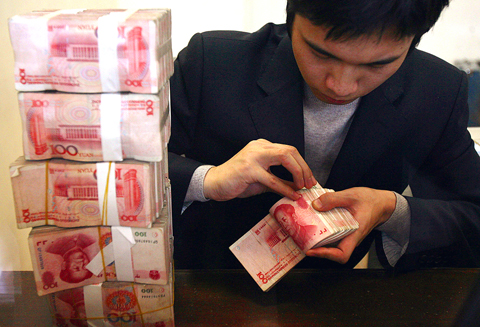China said it plans to increase the amount of money circulating in its economy next year in a new effort to spur consumer spending and shield the country from a global downturn.
Saturday’s announcement by the State Council, or Cabinet, comes on the heels of a multibillion-dollar economic stimulus package announced last month that calls for injecting more government money into the economy through spending on construction and other projects.
There are mounting signs that China’s economic slowdown is sharper and deeper than expected. Exports fell last month for the first time in seven years and Chinese Industry Minister Li Yizhong (李毅中) warned on Friday that worse was to come.

PHOTO: AFP
China will increase its money supply by 17 percent next year, the Cabinet said in a statement on its Web site. It said that would be 3 percentage points to 4 percentage points above the total growth of economic output and consumer prices.
Increasing the supply of money is aimed at stimulating domestic economic activity and spending by making more credit available to encourage consumers and companies to borrow.
“We must strengthen the role of the financial sector in supporting economic growth by better implementing an active fiscal policy and moderately easing monetary policy,” the Cabinet statement said.
The growth rate of China’s money supply slipped this year as business activity and bank lending slowed.
The growth in China’s broadest measure of money supply shrank from 16 percent in August to 15 percent last month, the central bank said. That measure, known as M2, includes cash and bank deposits.
The Cabinet also decided to increase by 100 billion yuan (US$14.6 billion) the amount of loans for the country’s policy banks this year and suspend and reduce the sale of some central bank securities, the statement said.
The central bank has been draining billions of dollars from the economy every month to reduce pressure for prices to rise as revenues from China’s booming export industries flood through the economy.
The government said it would stop sales of three-year central bank notes and reduce sales of one-year and three-month bank notes, but gave no other details.
With economic growth forecast at 9 percent and inflation at about 6 percent this year, China’s money supply growth has just kept pace with growth in commercial activity. With both growth and inflation forecast to be lower next year, the planned expansion in money supply should be much larger than is needed to maintain commercial activity.
Li said on Friday that the government will spend 15 billion yuan (US$2.2 billion) to subsidize loans to companies to improve technology and cut energy use. Li said Beijing might buy surplus steel to help producers as demand plummets, as well as cut taxes to spur auto and real estate sales.

MISINFORMATION: The generated content tends to adopt China’s official stance, such as ‘Taiwan is currently governed by the Chinese central government,’ the NSB said Five China-developed artificial intelligence (AI) language models exhibit cybersecurity risks and content biases, an inspection conducted by the National Security Bureau (NSB) showed. The five AI tools are: DeepSeek, Doubao (豆包), Yiyan (文心一言), Tongyi (通義千問) and Yuanbao (騰訊元寶), the bureau said, advising people to remain vigilant to protect personal data privacy and corporate business secrets. The NSB said it, in accordance with the National Intelligence Services Act (國家情報工作法), has reviewed international cybersecurity reports and intelligence, and coordinated with the Ministry of Justice Investigation Bureau and the National Police Agency’s Criminal Investigation Bureau to conduct an inspection of China-made AI language

LIMITS: While China increases military pressure on Taiwan and expands its use of cognitive warfare, it is unwilling to target tech supply chains, the report said US and Taiwan military officials have warned that the Chinese People’s Liberation Army (PLA) could implement a blockade within “a matter of hours” and need only “minimal conversion time” prior to an attack on Taiwan, a report released on Tuesday by the US Senate’s China Economic and Security Review Commission said. “While there is no indication that China is planning an imminent attack, the United States and its allies and partners can no longer assume that a Taiwan contingency is a distant possibility for which they would have ample time to prepare,” it said. The commission made the comments in its annual

CHECKING BOUNDARIES: China wants to disrupt solidarity among democracies and test their red lines, but it is instead pushing nations to become more united, an expert said The US Department of State on Friday expressed deep concern over a Chinese public security agency’s investigation into Legislator Puma Shen (沈伯洋) for “secession.” “China’s actions threaten free speech and erode norms that have underpinned the cross-strait ‘status quo’ for decades,” a US Department of State spokesperson said. The Chongqing Municipal Public Security Bureau late last month listed Shen as “wanted” and launched an investigation into alleged “secession-related” criminal activities, including his founding of the Kuma Academy, a civil defense organization that prepares people for an invasion by China. The spokesperson said that the US was “deeply concerned” about the bureau investigating Shen

‘TROUBLEMAKER’: Most countries believe that it is China — rather than Taiwan — that is undermining regional peace and stability with its coercive tactics, the president said China should restrain itself and refrain from being a troublemaker that sabotages peace and stability in the Indo-Pacific region, President William Lai (賴清德) said yesterday. Lai made the remarks after China Coast Guard vessels sailed into disputed waters off the Senkaku Islands — known as the Diaoyutai Islands (釣魚台) in Taiwan — following a remark Japanese Prime Minister Sanae Takaichi made regarding Taiwan. Takaichi during a parliamentary session on Nov. 7 said that a “Taiwan contingency” involving a Chinese naval blockade could qualify as a “survival-threatening situation” for Japan, and trigger Tokyo’s deployment of its military for defense. Asked about the escalating tensions